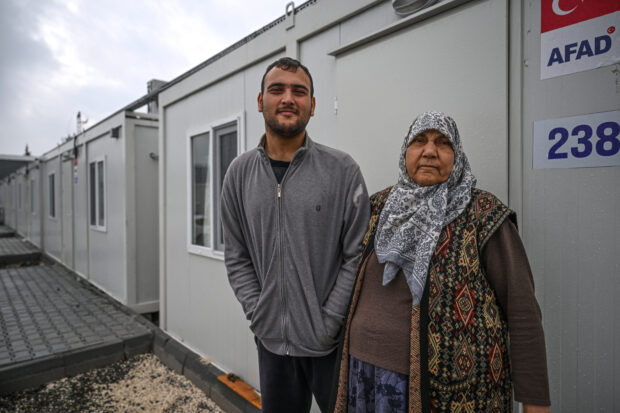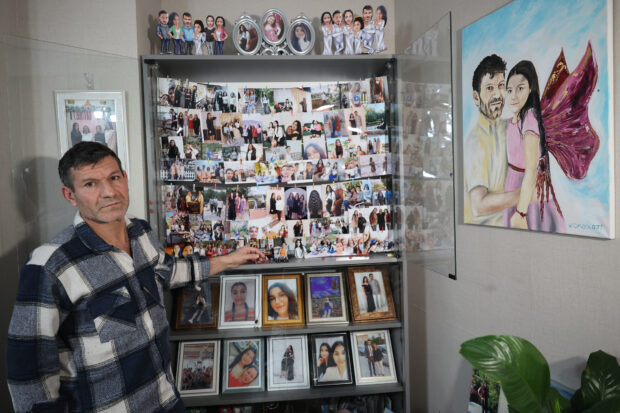Turkey quake survivors seek justice one year on

Kadiye Zarac, 71, housewife, poses with her son outside a line of housing containers, where they live following the February 2023 earthquake, in Antakya, in Hatay province on January 12, 2024. AFP
KAHRAMANMARAS, Turkey — Zahide Seker contemplated suicide many times after losing almost her entire family in Turkey’s massive earthquake one year ago.
Instead, the 48-year-old decided to pin her hopes on a fight for justice, demanding that those she holds responsible for the collapse of her building near the quake’s epicenter in the city of Kahramanmaras are hunted down and brought to account.
“I will not stay silent until justice is served,” she told AFP at one of the small container homes that serve as the temporary residences for hundreds of thousands of survivors across 11 quake-hit provinces.
Seker lived in Kahramanmaras’s Ebrar complex, a centrally located group of eight-floor buildings where 1,400 died when the first 7.8-magnitude tremor struck in the pre-dawn hours of February 6, 2023.
Officials said nearly 7,500 buildings collapsed in the city centre alone, overwhelming rescuers in snowy storms that descended on the region at the time.
Article continues after this advertisementSeker pulled out the bodies of her two children with her bare hands on the sixth day.
Article continues after this advertisement“They took away my joy for life. It’s been a year. I can’t get over this trauma. I wanted to die many times,” she said, breaking down in tears.
“Only justice will console me now.”
Ignored warnings
The disaster, which killed more than 50,000 people in all, was Turkey’s deadliest in many centuries.
President Recep Tayyip Erdogan blamed the scale of the toll on negligent building contractors, accusing them of cutting corners by using cheap concrete and ignoring basic construction standards.
READ: Earthquake death toll in Turkey rises to 43,556, minister says
More than 200 contractors and developers were arrested in the immediate aftermath of the quake. Some tried to flee abroad and were detained at Istanbul airports.
But lawyers representing victims’ families fear that numerous contractors may escape blame because much of the incriminating evidence disappeared when bulldozers cleared the debris.
Meanwhile, probes into public officials who approved building permits and signed off on the safety inspections may only be launched with the interior ministry’s permission, which has been conspicuous by its absence.
Nebahat Pacala, who lost her husband, daughter and granddaughter, said she kept warning contractors they were building on unstable ground and violating safety codes.
“They built a prayer room below the first floor. They cut the supporting columns,” 68-year-old said, adding that her apartment walls had begun to swell because of water damage.

Mesut Hancer, stands infront of photographs of his 15-year-old-daughter Irmak, victim of the earthquake that hit Turkey’s southeast on February 6, 2023, during an interview in Ankara on January 11, 2024. AFP
“But the contractors threatened my son when we warned them,” Pacala said.
Missing evidence
Tevfik Tepebasi, a senior contractor at the Ebrar site, argued in court that he should not be charged with a crime because, he said, “I don’t know anything about construction” — an argument that created uproar in the Turkish media.
He faces up to 22 and a half years in prison if convicted of causing death or injury by gross negligence, and is being prosecuted in other quake-related cases too.
Gamze Bilginer Dogan, 29, who lost her parents and nine-year-old daughter at the complex, was nervous before walking into court for the trial’s second hearing earlier this month.
“I am here so that Tepebasi does not walk free,” she told AFP.
An expert report obtained by AFP on one of the collapsed buildings at the complex concluded that rules were “not sufficiently complied with”.
The report identified local council officials responsible for project oversight as a “primary negligent party”.
But Omer Godeoglu, a lawyer for the families, said a lack of evidence could mitigate punishment for those responsible.
“While everyone was focused on their lost loved ones, evidence was removed and the rubble was cleared early,” he told AFP.
Controversial amnesty
At a rally in Kahramanmaras in 2019, Erdogan praised a hugely controversial zoning amnesty that allowed buildings erected in violation of safety standards to stay standing in return for a one-off payment to the government.
Erdogan called it a cure for Turkey’s chronic housing problems, offering 145,000 additional people homes in Kahramanmaras alone.
READ: Three rescued from Turkey rubble as earthquake death toll passes 45,000
Today, its detractors blame the zoning exemption for the quake’s tragic death toll.
“The zoning amnesty is legal on paper, but the question here is whether contractors sought to make a profit with the help of municipalities,” lawyer Godeoglu said.
At the ruins of a former five-floor building, Tuba Erdemoglu, 35, showed AFP pieces of foam usually used for insulation.
She alleged that foam — rather than reinforced concrete — was used in the building’s supporting columns.
Forty-four of the building’s residents died, including Erdemoglu’s sister and parents.
“This building collapsed in seconds. Foam was falling like snow,” Erdemoglu said.
“I want the local council staff to be included in the case,” she added. “I will never forgive those who murdered my family.”